NEWS
Citizenship Competence – A Key Competence for Lifelong Learning
Citizenship competence is essential for active participation in society. It involves awareness, responsibility, and engagement with both local and global communities.
What Does It Mean?
Citizenship competence means being informed, responsible, and active members of society. It includes understanding your rights and responsibilities, participating in social and public processes, and contributing to the development of democratic values.
Why Does It Matter?
Developing Citizenship competence enables you to make a meaningful contribution to society. Active involvement in social initiatives and engagement with public issues leads to positive change and the improvement of the environment we live in.
How Can We Improve?
- Stay informed about global and local issues.
- Participate in community initiatives and volunteer activities.
- Respect diversity and advocate for equality.
The With Digital Voices to Competences for Future project supports the development of civic competence among young people by encouraging discussions and active participation in public life.
(Funded by the European Union.)
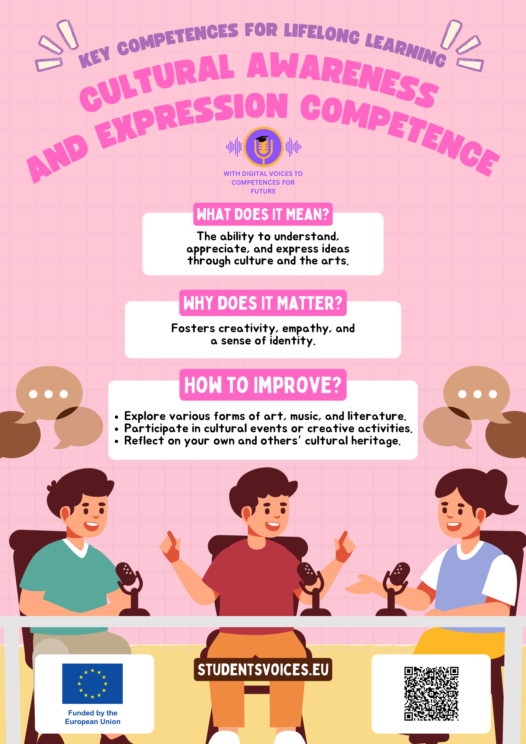
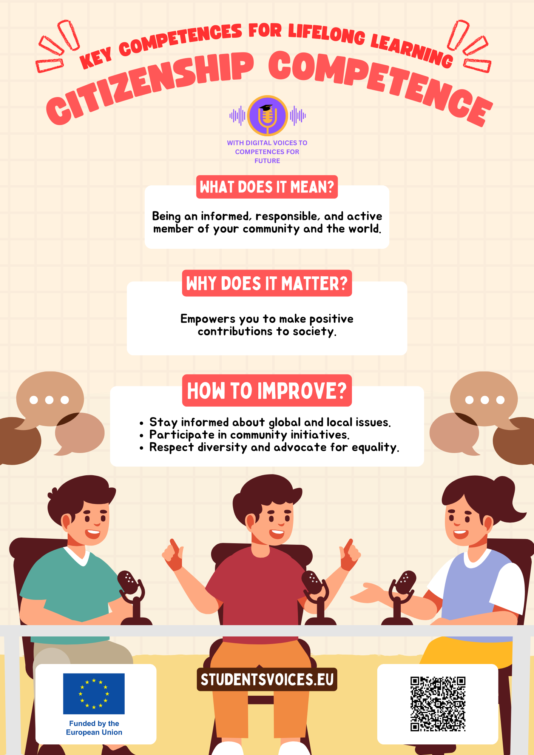
Cultural Awareness and Creative Expression – A Key Competence for Lifelong Learning
Cultural awareness and creative expression play a vital role in personal development and social integration. They help individuals understand and appreciate cultural diversity while expressing ideas through the arts.
What Does It Mean?
This competence includes the ability to understand, appreciate, and express ideas through culture and the arts.
Why Does It Matter?
- Encourages creativity and artistic thinking.
- Develops empathy and a sense of identity.
- Enhances understanding and acceptance of different cultures.
How Can We Improve?
- Explore various forms of art, music, and literature.
- Participate in cultural events or creative activities.
- Reflect on your own cultural heritage and that of others.
The With Digital Voices to Competences for Future project supports the development of cultural awareness through engagement in cultural and creative activities.
(Funded by the European Union.)
Digital Competence – A Key Competence for Lifelong Learning
Digital competence is one of the essential skills needed for success in the modern world. It involves the ability to confidently and critically use digital technologies for learning, communication, and collaboration.
What Does It Mean?
Digital competence refers to the ability to work with digital tools and platforms in a productive, safe, and ethical way.
Why Does It Matter?
- Enables easy navigation in the digital environment.
- Develops critical thinking and information literacy.
- Enhances effective communication and collaboration in online spaces.
How Can We Improve?
- Learn to use productive and creative software.
- Practice safe and ethical online behavior.
- Explore areas such as programming, graphic design, and digital marketing.
The With Digital Voices to Competences for Future project promotes the development of digital skills through engagement in practical and interactive activities.
(Funded by the European Union.)
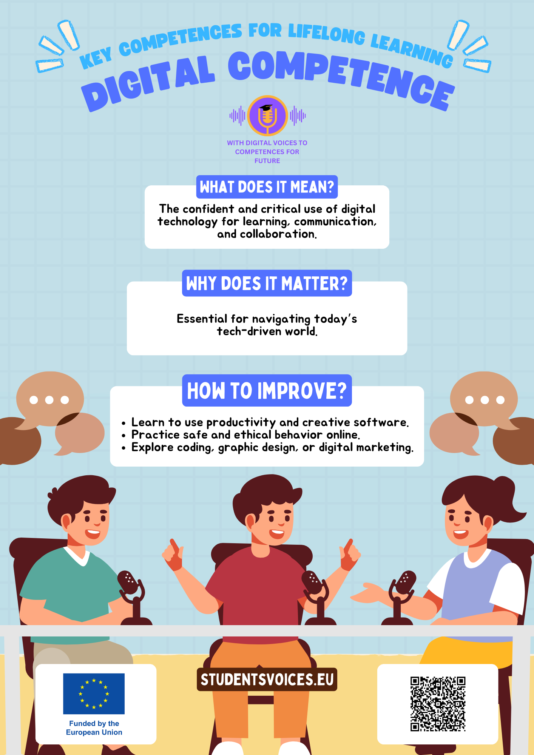
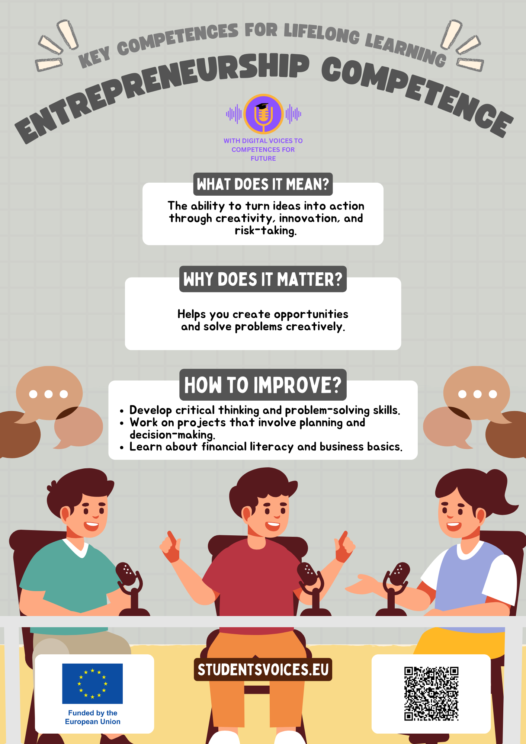
Entrepreneurship Competence – A Key Competence for Lifelong Learning
Initiative and entrepreneurship are among the essential skills that help people adapt and succeed in a dynamic world. They involve the ability to turn ideas into action through creativity, innovation, and risk-taking.
What Does It Mean?
Initiative and entrepreneurship refer to the ability to recognize opportunities, plan, and implement projects that create value for society.
Why Does It Matter?
- Encourages the development of independence and creative thinking.
- Contributes to personal growth and professional success.
- Facilitates the creation of new opportunities and problem-solving.
How Can We Improve?
- Develop critical thinking and problem-solving skills.
- Participate in projects that involve planning and decision-making.
- Learn more about financial literacy and business fundamentals.
The With Digital Voices to Competences for Future project supports the development of entrepreneurial skills through practical activities and teamwork.
(Funded by the European Union.)
Literacy Competence– A Key Competence for Lifelong Learning
Literacy competence is essential for personal and professional development. It involves the ability to read, write, understand, and critically engage with various texts and media.
What Does It Mean?
Literacy competence refers to the ability to comprehend, analyze, and interpret information from different sources, as well as the skill to express oneself effectively in writing and speech.
Why Does It Matter?
Strong language skills:
- Help articulate thoughts and ideas clearly.
- Improve academic and professional achievements.
- Support understanding of the world and effective communication with others.
How Can We Improve?
- Read books, articles, and online resources regularly.
- Practice creative and academic writing.
- Participate in discussions to develop critical thinking.
The With Digital Voices to Competences for Future project promotes language literacy through active learning and communication.
(Funded by the European Union.)
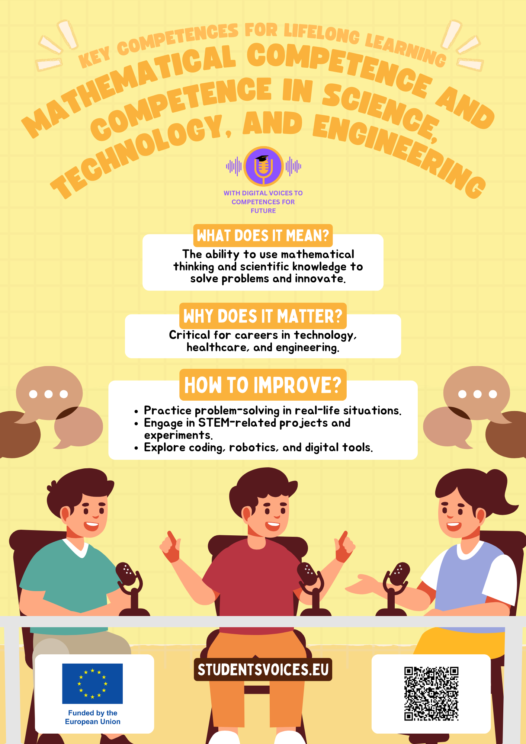
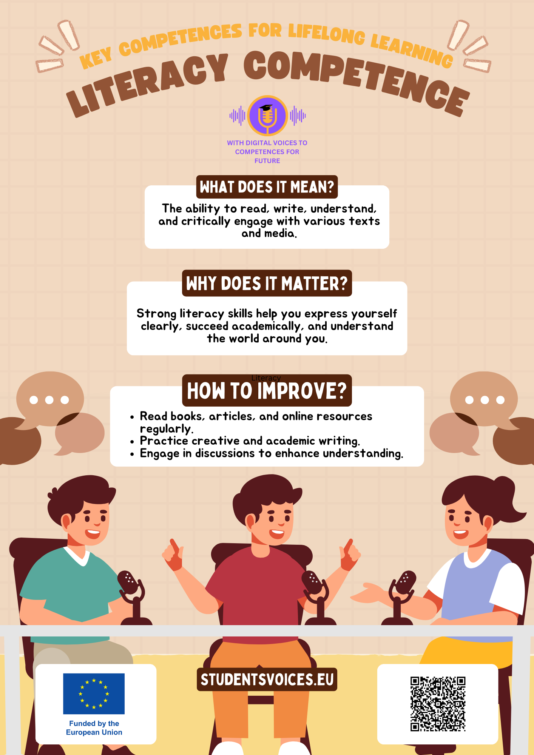
Mathematical Competence and Competence in Science, Technology, and Engineering – A Foundation for Innovation and Professional Growth
Mathematical Competence and Competence in Science, Technology, and Engineering play a crucial role in today's world. They support problem-solving, foster innovation, and open doors to many promising careers.
What Does It Mean?
Mathematical competence involves the ability to apply logical thinking, analysis, and a scientific approach to problem-solving. It includes skills such as calculations, modeling, critical thinking, and an experimental mindset.
Why Does It Matter?
- It is fundamental for careers in technology, engineering, healthcare, and science.
- Develops logical thinking and problem-solving skills.
- Facilitates understanding of the digital world and emerging technological solutions.
How Can We Improve?
- Solve real-life problems and practical challenges.
- Participate in STEM projects, experiments, and mathematical competitions.
- Explore topics such as coding, robotics, and digital technologies.
The With Digital Voices to Competences for Future initiative supports the development of mathematical and scientific skills through hands-on activities and innovative learning methods.
(Funded by the European Union.)
Multilingual Competence – A Key to the Global World
In today’s world, knowing more than one language is not just an advantage but a necessity. Multilingual competence plays a crucial role in communication, cultural understanding, and personal development.
What Does It Mean?
Multilingual competence is the ability to communicate effectively in more than one language. It includes not only speaking and writing but also understanding different cultural contexts and expressions.
Why Does It Matter?
- Opens doors to cultural understanding by enabling better interaction between people of different nationalities.
- Provides access to global opportunities in education, careers, and international projects.
- Contributes to personal growth by enhancing cognitive abilities and adaptability.
How Can We Improve?
- Practice speaking and writing in different languages through daily situations.
- Use digital resources and language-learning apps.
- Immerse yourself in other cultures through media, literature, and travel.
The With Digital Voices to Competences for Future project supports language skill development through innovative methods and digital technologies.
(Funded by the European Union.)
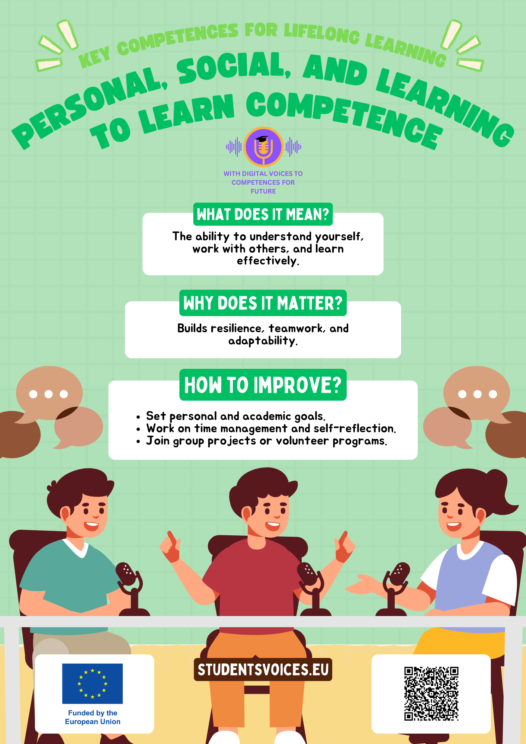
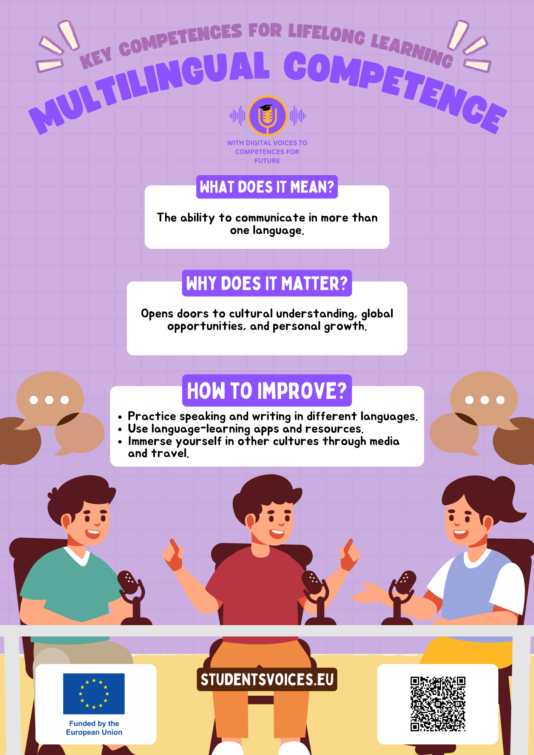
Personal, Social, and Learning to Learn Competence – Key Skills for Success
In today’s fast-changing world, understanding ourselves, collaborating with others, and learning effectively are essential. Developing personal, social, and learning-to-learn competence is the key to success in education, professional life, and personal growth.
What Does It Mean?
This competence includes the ability to understand our own emotions, build strong relationships, and develop skills for independent learning. It means being able to work in a team, analyze and adapt information to our needs, and apply what we have learned in practice.
Why Does It Matter?
- Builds resilience and adaptability in various life and professional situations.
- Improves teamwork and communication effectiveness.
- Develops time management, self-reflection, and independent learning skills.
How Can We Improve?
- Set clear personal and academic goals.
- Work on time management and develop self-reflection skills.
- Participate in group projects, volunteer initiatives, and extracurricular activities.
The With Digital Voices to Competences for Future project supports the development of these skills through innovative educational methods and digital technologies.
(Funded by the European Union.)
